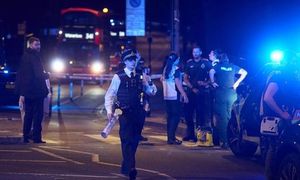The tension between Israel and Iran is reaching dizzying heights, particularly as experts weigh the potential consequences of Israeli military action against Iranian nuclear facilities. With the specter of nuclear proliferation looming larger, the consequences of such strikes could ripple far beyond the region itself.
Several analysts, including James Acton, co-director of the Carnegie Endowment for International Peace, argue emphatically against the likelihood of deterrence as a result of Israeli attacks. Acton stated, "such an attack would likely increase Iran’s determination to develop nuclear weapons instead of deterring it." His assessment highlights the complex and often counterproductive nature of military engagements, especially concerning nations involved with sensitive nuclear technologies. Unlike the previous engagements targeting nuclear reactors in Iraq and Syria, Iran’s nuclear infrastructure relies heavily on advanced centrifuge technology, which presents unique challenges.
Should Israel decide to pursue strikes against these facilities, the response from Iran could take several forms. Acton explained, "in response to an attack, Iran could relocate its facilities deeply underground or spread its centrifuges across civilian industrial sites, making them much harder to detect." This evolution not only complicates Israel's military strategy but also risks placing it on what some may call a perpetual war footing — involving repeated strikes every couple of years just to keep pace with Iran's advancements.
Further complicity arises with the potential need for Israel to utilize American-supplied Massive Ordnance Penetrator (MOP) bombs, particularly for fortified targets like the Fordow facility. Nevertheless, employing such weaponry would necessitate coordination and logistical support from the United States, raising questions about the strategic alignment between these two nations.
Another alarming prospect is the possibility of Iran coming to the definitive decision to pursue nuclear weapons manufacture following military strikes. Acton warned, "Such an attack makes it highly likely Iran would decide to develop a nuclear weapon." A nuclear-armed Iran could transform the Middle Eastern power dynamics, enabling Tehran to adopt more aggressive postures, potentially leading to direct attacks against Israel or its allies.
Diplomacy continues to be the watchword for many experts, as both Acton and Professor Hooshang Amirahmadi, who leads the American Iranian Council, agree on the urgent need for peaceful negotiation. U.S. officials have shared similar sentiments, opting for dialogue over military escalation. Secretary of State Antony Blinken acknowledged the grave situation, noting back in June 2024, "Iran could potentially produce enough fissile material for a nuclear weapon within a week or two," but still needing to take additional steps to turn this material usable. The idea of leveraging diplomacy remains underlined, especially after the United States withdrew from the Joint Comprehensive Plan of Action (JCPOA) back in 2018, which had initially sought to limit Iran's nuclear capacity.
Acton also described the geopolitical chess being played, where leadership changes within the U.S. could shift the dynamics concerning Iran’s nuclear ambitions. A potential return of Donald Trump to the White House could accelerate abandoning diplomatic pursuits, whereas Kamala Harris might continue focusing on negotiating new agreements, albeit perhaps without fervent priority.
Meanwhile, Iranian military officials are very vocal about their readiness and retaliation strategies should Israel make military moves. A senior officer from the Islamic Revolutionary Guard Corps (IRGC) recently warned about Iran’s capabilities, asserting they are prepared to strike Israel’s Dimona nuclear reactor and hinted at surprises exceeding their nuclear capabilities. Iranian officials maintain their stance against war, with Spokeswoman Fatemeh Mohajerani confirming, "Iran does not give up on its national interests... [and] is prepared to repeat larger and more widespread attacks at the appropriate time. This will be without hesitation and not merely reactive."
The realities of Iran’s nuclear advancements cannot be ignored. Iran reportedly remains just weeks away from enriching its uranium to military-grade levels. Experts like Sima Shine, who leads the Iran and the Shi’ite Axis Research Program at the Institute for National Security Studies, cautioned, "Regarding fissile material, they are very, very close. Within two to three weeks, they can enrich enough for three nuclear devices, and after, for three more within just weeks." This places any military action from Israel squarely under the microscope.
The complexity of the Iranian nuclear issue doesn't just reside with the quantity but also with the capacity to mount these materials onto delivery systems. This capability has been proven with continued tests of ballistic-missile delivery systems by Iran. Subsequently, Israeli officials have urged caution, warning of the long-lasting ramifications of the nuclear arsenal development — stressing the role of deterrence balancing with the risks of igniting open conflict.
The growing hostility and military preparedness on both sides could lead to significant geopolitical shifts within the region. Iran’s regional proxies, such as Hezbollah, have been reportedly weakened recently due to pressures from Israeli military efforts. Consequently, this development could influence Iran’s strategic calculations concerning nuclear weapons, creating even more perilous scenarios.
Continued military assessments and geopolitical dialogues will drive the narrative moving forward, demonstrating how delicate this balance remains. Should military action occur, there is no doubt it would reshape the current discourse around Iran and its nuclear aspirations, marking potentially dangerous precedents for future engagements within the Middle East and beyond. Every action taken now could lead to unforeseen consequences, as pointed out by experts who debate the fine line of deterrence versus provocation.
The exploration of these dynamics shouldn't just focus on short-term impacts but rather on the larger picture of international relations and peace efforts. The potential for escalation is substantial and lays bare the need for strategic foresight amid rising tensions. Only time will reveal if cooler heads will prevail, or if fervent military engagement will set the stage for larger conflicts.



